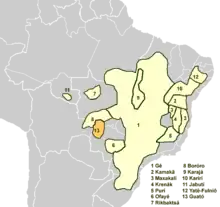Guató language
Guató is a possible language isolate spoken by 1% of the Guató people of Brazil.
| Guató | |
|---|---|
| Native to | Brazil, Bolivia |
| Region | Mato Grosso do Sul state: Paraguay River banks and up São Lourenço River, along Bolivian border;[1] also Santa Cruz Department (Bolivia): Uberaba Lake[2] |
| Ethnicity | 370 Guató people (2008)[1] |
Native speakers | 5 (2011)[1] |
| Language codes | |
| ISO 639-3 | gta |
| Glottolog | guat1253 |
| ELP | Guató[3] |
 | |
Classification
Kaufman (1990) provisionally classified Guató as a branch of the Macro-Jê languages, but no evidence for this was found by Eduardo Ribeiro. Martins (2011) also suggests a relationship with Macro-Jê.[4]
Language contact
Jolkesky (2016) notes that there are lexical similarities with the Bororo, Tupi, and Karib language families due to contact.[5]
An automated computational analysis (ASJP 4) by Müller et al. (2013)[6] found lexical similarities between Guató and the Zamucoan languages. However, since the analysis was automatically generated, the grouping could be either due to mutual lexical borrowing, genetic inheritance, or chance resemblances.
Distribution
In Mato Grosso do Sul, Brazil, Guató is spoken on the banks of the Paraguay River and up the São Lourenço River, along the Bolivian border.[7] It is also spoken at Uberaba Lake[2] in Santa Cruz Department (Bolivia).
Phonology
The Guató vowel system, like that of Macro-Jê languages, collapses a three-way distinction of height in oral vowels to two in nasal vowels.[8]
| Oral | Nasal | |||||
|---|---|---|---|---|---|---|
| Front | Central | Back | Front | Central | Back | |
| Close | i | ɨ | u | ĩ | ɨ̃ | ũ |
| Mid | e | o | ẽ | ã | ||
| Open | ɛ | a | ɔ | |||
| Labial | Denti- alveolar |
Post- alveolar |
Velar | Labio- velar |
Glottal | ||
|---|---|---|---|---|---|---|---|
| Nasal | m | n | |||||
| Plosive | voiced | b | d | dʒ | ɡ | ɡʷ | |
| voiceless | p | t | tʃ | k | kʷ | ||
| Fricative | f | h | |||||
| Sonorant | w | ɾ | j | ||||
Vocabulary
Loukotka (1968) lists the following basic vocabulary items for Guató.[2]
gloss Guató one chenéhe two dúni three chumó tooth makuá tongue mundokuír hand mara woman muazya water mágũ fire matá moon múpina maize madzyéro jaguar mépago house movír
For more extensive vocabulary lists of Guató by Palácio (1984)[9][10] and Postigo (2009),[11] see the corresponding Portuguese article.
References
| Wiktionary has word lists at Appendix:Guató word lists |
- Guató at Ethnologue (19th ed., 2016)
- Loukotka, Čestmír (1968). Classification of South American Indian languages. Los Angeles: UCLA Latin American Center.
- Endangered Languages Project data for Guató.
- Martins, Andérbio Márcio Silva. 2011. Uma avaliação da hipótese de relações genéticas entre o Guató e o tronco Macro-Jê. Doutorado em Linguística. Universidade de Brasília.
- Jolkesky, Marcelo Pinho de Valhery (2016). Estudo arqueo-ecolinguístico das terras tropicais sul-americanas (Ph.D. dissertation) (2 ed.). Brasília: University of Brasília.
- Müller, André, Viveka Velupillai, Søren Wichmann, Cecil H. Brown, Eric W. Holman, Sebastian Sauppe, Pamela Brown, Harald Hammarström, Oleg Belyaev, Johann-Mattis List, Dik Bakker, Dmitri Egorov, Matthias Urban, Robert Mailhammer, Matthew S. Dryer, Evgenia Korovina, David Beck, Helen Geyer, Pattie Epps, Anthony Grant, and Pilar Valenzuela. 2013. ASJP World Language Trees of Lexical Similarity: Version 4 (October 2013).
- Eberhard, David M.; Simons, Gary F.; Fennig, Charles D., eds. (2019). "Brazil languages". Ethnologue: Languages of the World (22nd ed.). Dallas: SIL International.
- A. P. Palacios, 1984; A. V. Postigo, 2009
- Palácio, Adair Pimentel. 1984. Guató: a língua dos índios canoeiros do rio Paraguai. Campinas: Univ. Dissertação doutoral, Universidade Estadual de Campinas.
- Martins, Andérbio Márcio Silva. 2011. Uma avaliação da hipótese de relações genéticas entre o Guató e o tronco Macro-Jê. Dissertação doutoral, Universidade de Brasília.
- Postigo, Adriana Viana. 2009. Fonologia da língua Guató. Dissertação de mestrado. Três Lagoas: Universidade Federal de Mato Grosso do Sul.